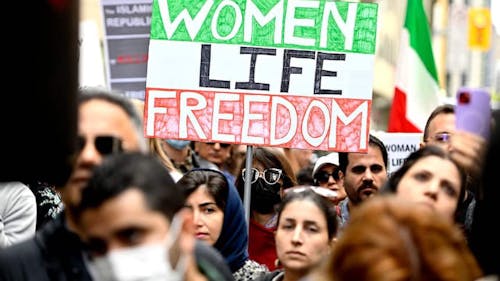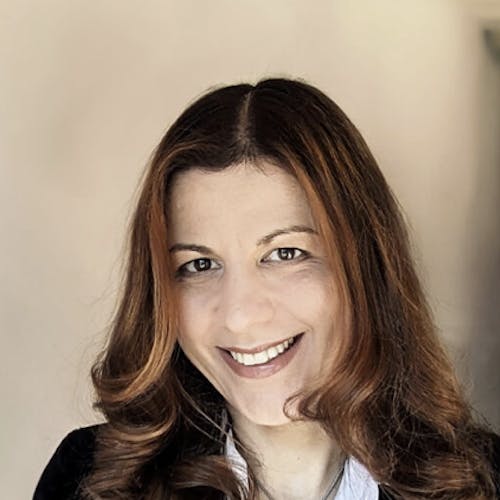How does media, international attention affect current protests in Iran? U. experts discuss

On September 16, a young Kurdish Iranian woman named Mahsa Amini died in Tehran while being detained by Iran's morality police. The 22-year-old had been arrested days earlier for not wearing a hijab, as mandated by the government.
While authorities maintained that Amini had died due to a heart attack, many members of the Iranian public suspect police brutality as the true cause of her death. For the past several weeks, individuals, including students, have gathered throughout Iran to protest Amini’s death and the morality police.
On November 10, Rutgers Global and the Center for Middle Eastern Studies conducted a panel focused on these protests, according to the event's registration page.
Neda Bolourchi is an associate director of the center and postdoctoral associate in the Middle Eastern Studies Program and was a panel moderator. She said that the event featured five speakers who could provide multiple points of insight on the protests.
During the panel, Bolourchi said that she specifically spoke about her experiences in human rights litigation in the Middle East and the lackluster acknowledgment of the situation in Iran from other countries.
She said that collectively, the presenters discussed the role that Tehran University students and literature have played in the current protests and the general history of resistance pertaining to gender equality in the country. The panel’s audience consisted of participants from the U.K., Eastern Europe and Canada.
Bolourchi said that a takeaway for attendees and readers includes the foundational purpose of the protests, which is not to protest the hijab or religion. Instead, these protests are centered around the basic right to self-determination, something men in the country have also aligned with. She said that rights that fall under the umbrella of personal freedom include rights to work, expression, marriage, divorce and association.
"These protests are about a people denied fundamental rights the majority of the world's population takes for granted," Bolourchi said. "These protests — begun by, centered by and about — are about women's rights as human rights."
Another element she discussed was the role the U.S. should play in this issue. She said that Iranians are not calling for the U.S. to intervene and instead, Americans should show their support for the protests by advocating for economic penalties for Iranian officials and their relatives and by expanding news coverage.
Afrooz Mosallaeipour, a doctoral student in the Department of Journalism and Media Studies and panel attendee, said that Western media is covering protests in Iran differently now than how previous protests in the country have been depicted.
Specifically, she spoke about how the current protests have received more attention from public figures and media, how coverage has included more reports from ordinary citizens rather than state-run outlets and how there has been a larger focus on police brutality instead of violence from protestors.
"Iranian people have always yearned for attention, and I think this time, they have achieved what they want," Mosallaeipour said. "We still need more attention from power holders and individuals and institutions that can do something in favor of women and people in Iran, so being updated on the latest news is extremely important."
She said social media has been instrumental in bringing attention to protests because it offers access to relevant hashtags and accounts that can report on the events. Though, various representations of the protests, such as the publicized destruction of hijabs, have led people online to misconstrue their actual meaning, Mosallaeipour said.
"We have seen lots and lots of TikTokers who think these protests are anti-Islam and that Iranian women burning their mandatory hijab is offending their beliefs," she said. "I think they should know that it's not about them; it's about Iranian women seeking bodily autonomy which they have been deprived of for many decades."
Mosallaeipour said that in the U.S., conscious consumption and portrayal of these protests also extends to traditional media. She said American coverage of the protests typically places emphasis on the U.S.’ economic sanctions rather than the actual mission of the demonstration.
"In some instances, the articles have dedicated the entire message to sanctions and how by lifting them, the U.S. can support Iranians," Mosallaeipour said. "Such articles and coverage become problematic and reduce the cause of Iranian protestors to non-major issues."
She said when individuals outside of Iran hold demonstrations in their own countries in support of the cause, it makes Iranian protests feel uplifted and less isolated by their overseas communities, specifically non-resident Iranians.
Additionally, attention from public figures has been advantageous to recent movements, such as a petition to remove Iran as a member of the United Nations Commission on the Status of Women, Mosallaeipour said. With support from figures such as Oprah Winfrey and Michelle Obama, this mission has garnered international attention.
With respect to future events like this, Mosallaeipour said that having speakers build off each other would improve the presentation by making it more dynamic. She said that she would like to see more information regarding allyship for people who are not Iranian.
Mosallaeipour said that students at Rutgers should particularly be educating themselves on the issue, looking at the situation as a women's movement rather than an Iranian women's movement and supporting the cause.
"As I mentioned earlier, protesters need to be heard. They need to catch the attention of as many people as possible because the Iranian regime is so reliant on its international relations with other countries," she said. "Those relationships should be condemned; the presence of the regime's officials should be interrogated, and that only happens with demonstrations of the Iranian diaspora."



